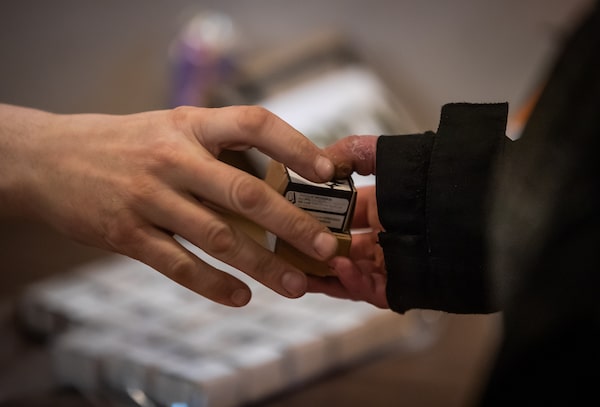
A person receives a tested supply of cocaine after gathering to remember those who died from a suspected illicit drug overdose, in Vancouver, on Feb. 9, 2022.DARRYL DYCK/The Canadian Press
The B.C. government has rejected the recommendation of an expert panel struck by the province’s coroners service to allow community-based agencies to provide access to regulated opioids and stimulants without prescriptions in efforts to combat drug deaths from the toxic illicit supply.
Such a move would have expanded the province’s fledging safer-supply program, which has been beset by challenges since its introduction three years ago.
“Non-prescription models for the delivery of pharmaceutical alternatives are not under consideration,” B.C. Minister of Mental Health and Addictions Jennifer Whiteside said in a letter to Chief Coroner Lisa Lapointe.
The recommendation from the death review panel was contained in a report released Wednesday. It coincided with the province’s latest illicit drug death figures, which showed that 175 people died in September. Since 2016, the year B.C. declared a public-health emergency in response to surging overdose deaths from an increasingly volatile drug supply, more than 13,300 people have died.
In announcing the report, Ms. Lapointe acknowledged the idea of providing a safer drug supply will raise alarm bells for some.
“The notion of providing access to controlled drugs to people already experiencing harm from controlled drugs can feel like a contradiction – I understand that,” she said. “If you had asked me several years ago, I, too, would have been skeptical about the value of that kind of initiative.”
Ms. Lapointe said an estimated 225,000 people in British Columbia use illicit substances and are at risk of death, while about 100,000 have been diagnosed with an opioid use disorder. As of August, there were 3,277 publicly funded adult and youth community substance use beds in the province; about 25,000 people receive medication-assisted treatment, such as with methadone or Suboxone; and about 4,500 have access to pharmaceutical alternatives through safer-supply programs.
“We can all do the math. We can heed the advice of multiple blue-ribbon, knowledgeable and informed panels, committees and task forces, and those with lived and living experience, and support greater access to safer supply as a component of an essential suite of initiatives to reduce harms our communities are experiencing from the current illicit drug market,” Ms. Lapointe said.
“Or, we can maintain or reduce the limited access to safer supply that currently exists and continue to experience increased harms and deaths we’ve suffered in our province for the past seven and a half years.”
The 21-member panel includes substance use specialists, regional health leaders, researchers, a police chief, B.C.’s representative for children and youth, and a peer clinical adviser.
Clinicians who provide safer supply say there are many barriers to the program, including the resource-intensive nature of one-to-one prescribing, the limitations of currently available medications, and the fear that these medications may be diverted, leading to unintended consequences.
The death review panel is recommending that the B.C. Ministry of Mental Health and Addictions apply to the federal ministers of Health and Mental Health and Addictions for a class exemption from the Controlled Drugs and Substances Act to allow access without a prescription to the class of opioid and stimulant drugs. It is also recommending that the provincial ministry develop an application for agencies to apply for licensure to distribute these drugs.
The panel noted in its report the need to balance low-barrier access for drug users while maintaining public health and safety. On diversion, the report proposed as one option that regulated substances could be provided at no cost to people consuming them onsite, while those wanting to take them offsite would be charged a price equivalent to those of street drugs, eliminating any economic benefit to divert.
A robust provincial and regional monitoring and evaluation process would need to be established, leveraging existing infrastructure, the report said. The capacity to monitor the impact of non-prescribed regulated drugs on deaths and emergency health services already exists.
In the letter to Ms. Lapointe sent Wednesday, Ms. Whiteside said she welcomed some of the expertise shared by panel members but swiftly rejected the panel’s bottom line. “I cannot accept the primary recommendation of this report to pursue a non-prescriber model of safer supply.”
Elenore Sturko, the BC United critic for mental health and addictions, similarly opposed the recommendations. The former RCMP officer said her party supports providing drug users with pharmaceutical alternatives to deadly street drugs as a short-term measure to help stabilize them, but that such an intervention must retain clinician oversight through a prescriber model.
On the argument that a prescriber model cannot be sufficiently scaled up, Ms. Sturko blamed the NDP government, noting how quickly and broadly COVID-19 vaccines were distributed.
“I do not believe for a second that with the medically available and pharmaceutically available alternatives to illicit drugs that do exist … that we could not scale them up,” she said. “I just think it’s a lack of leadership and lack of will.”